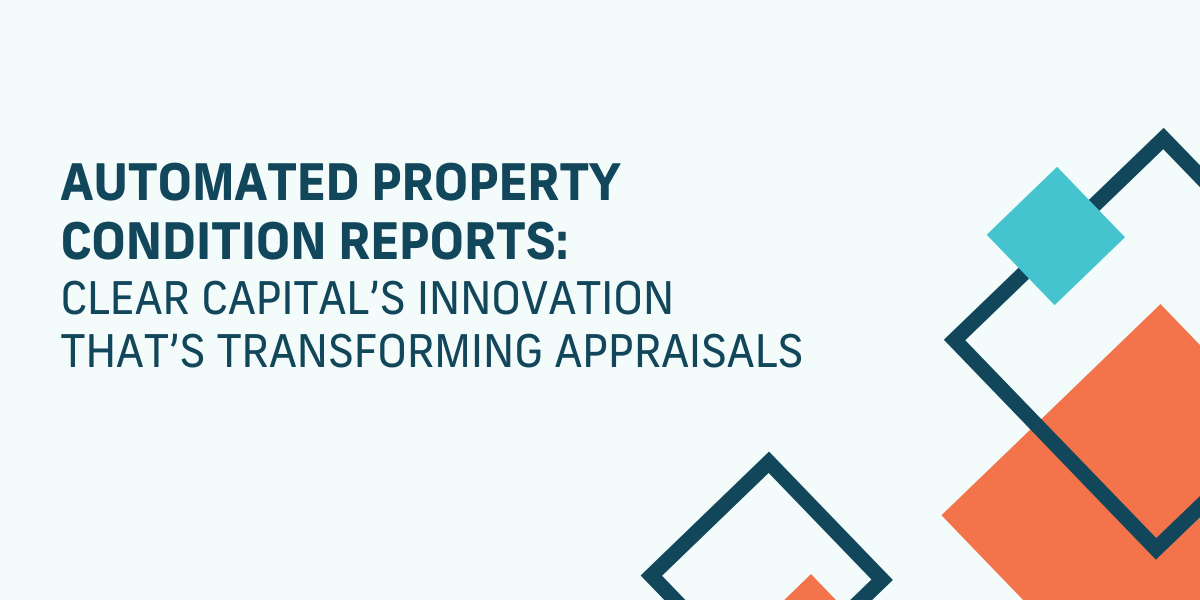Automated Property Condition Reports: Clear Capital’s Innovation That’s Transforming Appraisals
What Are Automated Property Condition Reports and Why Do They Matter?
Automated Property Condition Reports (APCRs) leverage advanced algorithms, remote data collection, and AI-driven property evaluation to provide a comprehensive assessment of a property’s condition. Unlike traditional appraisals, which rely heavily on in-person inspections, APCRs compile essential data quickly from scalable sources like satellite imagery, MLS data, public records, and local market trends.
Why They Matter:
- APCRs reduce appraisal delays.
- They minimize human subjectivity, leading to more consistent evaluations.
- They provide mortgage professionals with quick, reliable data to make underwriting decisions.
Note: While automation reduces human bias, AI models can introduce systemic bias if not monitored carefully.
Takeaway: APCRs are faster, more consistent, and scalable, making them a game-changer for mortgage professionals navigating today’s fast-paced housing market.
How Are APCRs Reducing Inefficiencies in the Appraisal Process?
Traditional appraisals can be time-consuming and logistically cumbersome. By contrast, APCRs eliminate many manual and repetitive tasks, allowing mortgage professionals to streamline workflows and close loans faster.
Key Benefits of Reduced Inefficiencies:
- Faster Turnaround: APCRs can process data in hours, compared to days or weeks with traditional appraisals.
- Reduced Dependency on On-Site Visits: APCRs draw on digital data, which means fewer delays waiting for appraisers to schedule inspections.
- Scalability: Whether assessing one property or a portfolio, automated tools scale without impacting speed or quality.
Note: Many lenders use APCRs selectively—for example, on lower-risk loans or portfolio reviews—while reserving full appraisals for complex or high-value properties.
Takeaway: By accelerating workflows and removing bottlenecks, APCRs allow mortgage professionals to focus on higher-value tasks.
Can APCRs Improve Accuracy in Mortgage Underwriting?
Accuracy is fundamental in mortgage underwriting, and APCRs are proving to be a reliable partner. Clear Capital’s technology minimizes the subjectivity that traditionally comes with in-person assessments, relying instead on standardized data and analytics.
How Accuracy Is Improved:
- Consistent Valuations: Automation ensures uniformity across all reports, reducing variability.
- Enhanced Data Integration: APCRs pull data from multiple sources, ensuring nothing is overlooked.
- Risk Mitigation: More accurate property reports help lenders avoid overvaluations, reducing default risks.
Note: Most lenders pair automated reports with human review to ensure compliance with investor and regulator standards.
Takeaway: With APCRs, underwriters gain confidence in the data they’re working with, leading to better loan decisions.
What Does This Mean for the Future of Appraisals?
While automated tools will not replace appraisers completely, they are redefining the role appraisers play. Rather than spending hours on repetitive tasks, appraisers can focus on complex, high-value assessments and reviewing edge cases. Companies like Clear Capital signal a future where appraisers and technology work in tandem.
What’s Next?
- AI and automation will expand into more property-related areas such as predictive maintenance and portfolio risk modeling.
- Expect continued collaboration between tech firms, lenders, and regulators to refine and human-proof automation tools.
Takeaway: The future of appraisals is a hybrid approach—technology for efficiency, human expertise for oversight.
3 Ways Mortgage Professionals Can Get Started with APCRs
- Evaluate Your LOS/Technology Stack: Check if your loan origination system (LOS) or underwriting platform already integrates with providers like Clear Capital.
- Pilot APCRs on Lower-Risk Loans: Test APCR adoption in limited use cases (refis, well-documented homes) to measure impact before scaling.
- Train Teams on Hybrid Models: Educate staff on when to trust automated reports and when to escalate to full human appraisal.
Takeaway: Adopting APCRs doesn’t have to be all-or-nothing—mortgage professionals can start small, measure results, and expand adoption strategically.
Other Automated Appraisal and Condition Report Solutions Worth Exploring
While Clear Capital’s APCRs are a leading innovation, they’re not the only solution available. Mortgage professionals may want to explore other technology providers that bring automation, data intelligence, and AI-driven efficiencies to the appraisal process:
Reggora
Reggora is a modern appraisal management platform that streamlines the ordering, tracking, and review of appraisals. Its automation improves speed and transparency, helping lenders deliver a smoother borrower experience.
HomeVision (MIRA)
HomeVision’s Machine Intelligence Review Assistant (MIRA) uses advanced OCR, NLP, and machine learning to improve appraisal quality control. By leveraging AI, MIRA reduces manual review time and enhances report accuracy.
Appraisal Vision
Appraisal Vision combines automation with data-driven risk intelligence to deliver greater transparency and efficiency in the appraisal process. Its platform provides lenders with real-time insights and the ability to better manage appraisal workflows at scale.
Comparison of Automated Appraisal & Property Condition Solutions
| Provider | Core Offering | Key Features | Best For | Learn More |
|---|---|---|---|---|
| Clear Capital (APCRs) | Automated Property Condition Reports | AI-driven assessments; remote data sources (imagery, public records, MLS); faster underwriting | Lenders seeking scalable, consistent condition reports | Clear Capital |
| Reggora | Appraisal Management Platform | End-to-end appraisal ordering, tracking, delivery; automation for speed and transparency | Lenders wanting streamlined workflows and faster turnarounds | Reggora |
| HomeVision (MIRA) | Machine Intelligence Review Assistant | OCR, NLP, and machine learning for QC; AI-driven appraisal review | Teams focused on improving quality control and reducing manual review time | HomeVision |
| Appraisal Vision | Data-Driven Appraisal Intelligence Platform | Real-time risk intelligence, transparency, automated workflows | Lenders prioritizing risk management and operational oversight | Appraisal Vision |
Takeaway: Mortgage professionals have multiple options when adopting appraisal technology. Whether it’s Clear Capital’s APCRs, Reggora’s streamlined workflows, HomeVision’s AI-driven review, or AppraisalVision’s risk intelligence, the future of appraisals lies in combining automation with human expertise.
Conclusion
Clear Capital’s automated property condition reports are rewriting the rulebook for the appraisal process. By enhancing speed, eliminating inefficiencies, and improving accuracy, this technology is giving mortgage professionals the tools they need to make smarter, quicker decisions. As the mortgage landscape evolves, embracing innovations like APCRs—while balancing regulatory requirements and human oversight—will be key for staying competitive.
Frequently Asked Questions
1. What is an automated property condition report (APCR)?
An APCR is a digital property assessment that uses technology like AI, remote data collection, and analytics to evaluate a home’s condition. This reduces the need for physical inspections in many cases, expediting the process.
2. Are automated property condition reports reliable?
Yes, APCRs are highly reliable for many lending scenarios. They aggregate data from multiple reputable sources to ensure accuracy and consistency. However, lenders often combine APCRs with human review for compliance and complex properties.
3. Will APCRs replace traditional appraisals?
Not completely. APCRs handle routine cases effectively, but traditional appraisals remain essential for complex valuations, high-value homes, and regulatory requirements.
4. What are the biggest advantages of Clear Capital’s APCRs?
The main advantages are faster turnaround times, reduced subjectivity, and greater scalability. They streamline the appraisal process, making it more efficient for lenders, underwriters, and borrowers.
5. How can mortgage professionals start using APCRs?
Mortgage professionals can adopt APCRs by working with providers like Clear Capital, who integrate their tools into existing workflows and LOS platforms. Starting with pilots in low-risk loans is a common first step.




